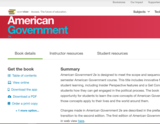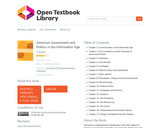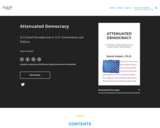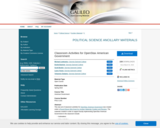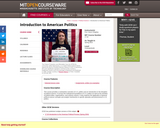Part 1: Thinking Like a Political Scientist
Chapter 1: What is Politics
Chapter 2: The Nature of Political Power
Chapter 3: Who Has Power in U. S. Politics?
Chapter 4: Political Science as a Social Science
Chapter 5: Common Fallacies in Argumentation
Chapter 6: Making Strong Arguments
Chapter 7: Basic Political Analysis
Chapter 8: Six Very Powerful Questions
Chapter 9: Critical Reading and Reflection
Chapter 10: The Context of U. S. Government and Politics
Part 2: Constitutional Foundations
Chapter 11: Natural Rights and the Declaration of Independence
Chapter 12: Articles of Confederation, Shays' Rebellion and the Road to the Constitution
Chapter 13: Key Features of the U. S. Constitution
Chapter 14: The Battle for Ratification and the Bill of Rights
Chapter 15: A Federal Republic
Chapter 16: Federalism's Historical Development
Chapter 17: A Secular Republic
Chapter 18: Amending the Constitution
Chapter 19: How Democratic is the U. S. Constitution?
Part 3: Congress
Chapter 20: Who are Our Members of Congress and Whom Do They Represent?
Chapter 21: Congressional Roles
Chapter 22: How Congress Passes Legislation
Chapter 23: Pathologies of Congressional Behavior
Chapter 24: The Undemocratic Senate
Part 4: The Presidency
Chapter 25: The President as Person and Institution
Chapter 26: The Vice President and Presidential Succession
Chapter 27: The President's Domestic Powers
Chapter 28: The President's Foreign Policy Powers
Chapter 29: Contemporary Issues of Presidential Power
Chapter 30: Impeachment and Removal of the President
Part 5: The Supreme Court
Chapter 31: Purpose and Operation of the Supreme Court
Chapter 32: Paths to the Supreme Court
Chapter 33: Appointing and Confirming Supreme Court Justices
Chapter 34: The Interpretive Work of the Supreme Court
Chapter 35: The Supreme Court as an Ideological Actor
Part 6: The Federal Bureaucracy
Chapter 36: Government is Good
Chapter 37: The Scope and Size of the Federal Government
Chapter 38: The Work of the Federal Civil Service and Political Appointees
Chapter 39: Revolving Doors and Corporate Capture of Federal Agencies
Chapter 40: American Budget Priorities
Part 7: Linkage Institutions
Chapter 41: What Do Political Parties Do?
Chapter 42: The Historical Development of American Political Parties
Chapter 43: Policy Preferences of American Political Parties
Chapter 44: Why Do We Have a Two-Party System?
Chapter 45: The Universe of Organized Interests
Chapter 46: Strategies of Organized Interests
Chapter 47: The Historical Development of the News Media
Chapter 48: The Contemporary News Media Ecosystem
Part 8: Electoral Politics and Public Opinion
Chapter 49: Expanding Voting Eligibility in American History
Chapter 50: Early Election Reforms
Chapter 51: The Electoral College
Chapter 52: The Integrity of American Elections
Chapter 53: Gerrymandering
Chapter 54: Campaign Finance
Chapter 55: The Advantages of Incumbency
Chapter 56: Public Opinion and Political Socialization
Part 9: Individual Political Behavior
Chapter 57: Voting
Chapter 58: Beyond Voting
Chapter 59: Civil Disobedience
Chapter 60: Political Violence
Chapter 61: A Guide to Living in an Attenuated Democracy
Part 10: Civil Rights and Civil Liberties
Chapter 62: The Difference Between Civil Rights and Civil Liberties
Chapter 63: Incorporation or Nationalization of the Bill of Rights
Chapter 64: The Boundaries of Freedom of Speech and the Press
Chapter 65: The Law and Politics of Religious Freedom
Chapter 66: The Individual and the Criminal Justice System
Chapter 67: Threats to Individual Freedom--Government Versus Corporations
Chapter 68: Civil Rights Case Study--Race
Chapter 69: Civil Rights Case Study--Sex
Chapter 70: Civil Rights Case Study--Sexual Orientation
Access is also available here: https://slcc.pressbooks.pub/attenuateddemocracy/



